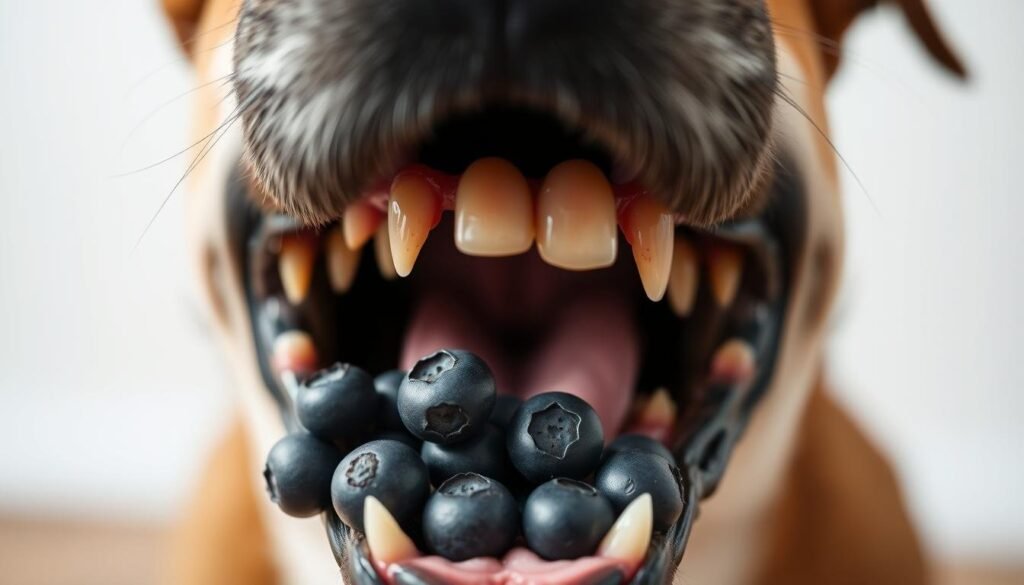If you’re a dog owner, you’re always looking for ways to keep your pet healthy. This includes their dental health. There’s a growing interest in using frozen blueberries to help with this.
Using frozen blueberries for dog dental health might sound strange. But some pet owners say it works. It’s worth looking into how blueberries can help your dog’s teeth.
Blueberries are packed with nutrients, and they might help your dog’s teeth too. Let’s dive into how blueberries could benefit your dog’s dental health. This way, you can make better choices for your pet’s oral care.
Contents
- 1 Blueberries and Dogs: A Safe Combination?
- 2 Are Frozen Blueberries Good for Dogs’ Teeth?
- 3 Potential Risks and Considerations
- 4 How to Serve Frozen Blueberries to Your Dog
- 5 Conclusion
- 6 FAQ
- 6.1 Are frozen blueberries a suitable replacement for regular dog dental care?
- 6.2 Can frozen blueberries cause allergic reactions in dogs?
- 6.3 How should I introduce frozen blueberries to my dog’s diet?
- 6.4 Can frozen blueberries help reduce tartar on my dog’s teeth?
- 6.5 Are there any dog breeds that should avoid frozen blueberries?
- 6.6 How many frozen blueberries can I safely give to my dog?
- 6.7 Can puppies eat frozen blueberries?
Blueberries and Dogs: A Safe Combination?
Blueberries are becoming more popular as a superfood. Dog owners wonder if they can share this healthy snack with their pets. The good news is that blueberries are generally safe for dogs to eat.
Blueberries are packed with antioxidants, fiber, and vitamins. They are a nutritious snack for both humans and dogs. The antioxidants in blueberries protect your dog’s cells from damage. This supports their overall health and may reduce the risk of certain diseases.
Antioxidant Properties of Blueberries
The antioxidant properties of blueberries are a big plus. Antioxidants fight free radicals, which can harm your dog’s health. Adding blueberries to your dog’s diet gives them a boost of antioxidants. This supports their overall well-being.
When feeding your dog blueberries, do it in moderation. While they are safe, too many can upset their stomach due to fiber. You can give your dog fresh or frozen blueberries as an occasional treat. Always introduce new foods slowly to avoid any bad reactions.
For dog owners worried about their pet’s teeth health, blueberries might help. They have anti-inflammatory properties and are full of antioxidants. But, remember, treats alone can’t prevent dental problems. Regular dental care is still important.
Are Frozen Blueberries Good for Dogs’ Teeth?
Frozen fruits are becoming popular as dog treats. It’s important to know how frozen blueberries affect dogs’ teeth. They are not only a cool snack but also packed with antioxidants and nutrients.
But, their effect on dental health worries many pet owners. Frozen blueberries have a special texture. This can be good or bad for dogs’ teeth.
The cold and hard texture of frozen blueberries can help clean teeth. Chewing on them might remove food bits. But, chewing too much could harm teeth, especially if your dog already has dental problems.
Blueberries also have natural sugars. These sugars, though less than in many dog treats, can still harm teeth if not cleaned properly. Regular dental care is key to keeping your dog’s teeth healthy, even with frozen blueberries.
In summary, frozen blueberries can be a good treat for dogs in small amounts. They might help clean teeth, but be careful of risks for dogs with sensitive teeth or gums. Always talk to your vet to see what’s best for your dog.
Potential Risks and Considerations
Before giving your dog frozen blueberries, it’s important to think about the risks. Frozen blueberries can be a good snack, but there are things to watch out for. This ensures your dog stays safe.

Some dogs might not like blueberries or could be allergic. This can lead to mild stomach issues or serious reactions. Watch how your dog acts and feels if you’re trying frozen blueberries for the first time.
Signs of an allergy or sensitivity include itching, scratching, and upset stomach. In bad cases, it could be anaphylaxis. If you see these signs, get help from your vet right away.
To lower the risks of giving your dog frozen blueberries, follow these tips:
- Start with small amounts and add them slowly to avoid stomach problems.
- Keep an eye on your dog when they have frozen blueberries to avoid choking.
- Pick organic, fresh blueberries to cut down on pesticide risks.
Knowing the risks and how to avoid them makes frozen blueberries a safe treat for your dog. Always talk to your vet if you’re worried about your dog’s diet or health.
How to Serve Frozen Blueberries to Your Dog
Serving frozen blueberries to your dog can be a healthy treat. But, it’s key to do it right. Follow these tips to make sure your dog enjoys this snack safely.
Think about your dog’s size and breed when picking the right amount. Smaller dogs might just need a few frozen blueberries. But, bigger dogs can have more.
- Always check the blueberries for any signs of mold or spoilage before serving them to your dog.
- Serve frozen blueberries in moderation to avoid digestive upset.
- Monitor your dog’s reaction to frozen blueberries, as some dogs may have sensitivities or allergies.
- Consider using frozen blueberries as an occasional treat rather than a regular part of your dog’s diet.
It’s also important to understand that while blueberries can be beneficial for your dog’s teeth health, they should not replace regular dental care. Blueberries and dog teeth health are connected. The antioxidants in blueberries may help reduce inflammation and improve overall health, including oral health.
To introduce frozen blueberries into your dog’s diet safely, start with a small amount. If your dog enjoys the treat and shows no adverse reactions, you can continue to serve frozen blueberries in moderation.
By following these guidelines and being mindful of your dog’s individual needs and reactions, you can safely provide frozen blueberries as a healthy and enjoyable treat.
Conclusion
As a dog owner, you’re always looking for healthy treats for your pet. This includes treats that help with their dental health. Frozen blueberries have been suggested as a way to keep your dog’s teeth clean.
But, it’s important to think about the safety of giving frozen blueberries to dogs. Blueberries can be a good snack, but you need to give them to your dog carefully. Giving them in small amounts and at the right time can help avoid problems.
Choosing the right food for your dog is key to being a good pet owner. Knowing the good and bad of frozen blueberries helps you make the best choices. This way, you can keep your dog’s teeth and overall health in top shape.
FAQ
Are frozen blueberries a suitable replacement for regular dog dental care?
No, frozen blueberries can’t replace regular dental care for dogs. They might offer some benefits, but they’re not a substitute for brushing teeth or vet dental check-ups.
Can frozen blueberries cause allergic reactions in dogs?
Yes, some dogs might be allergic to blueberries. Watch for signs like itching, swelling, or digestive problems after giving them frozen blueberries. If you see these, talk to your vet.
How should I introduce frozen blueberries to my dog’s diet?
Start by giving your dog a few frozen blueberries at a time. This helps avoid upset stomachs. Watch how they react before adding more.
Can frozen blueberries help reduce tartar on my dog’s teeth?
Frozen blueberries might help a bit with tartar on teeth. But how well they work depends on your dog and the tartar level.
Are there any dog breeds that should avoid frozen blueberries?
Dogs with diabetes or obesity risks should eat frozen blueberries carefully because of their sugar. Always check with your vet for advice that fits your dog’s health.
How many frozen blueberries can I safely give to my dog?
The right amount of frozen blueberries for your dog depends on their size, breed, and health. Treats should be less than 10% of their daily calories. Your vet can give you specific advice.
Can puppies eat frozen blueberries?
Puppies can have frozen blueberries, but do it slowly and in small amounts. Also, make sure to cut or crush them to avoid choking.

Derrick Wilcox is a certified canine behaviorist with over 12 years of experience at Happy Paws Animal Clinic and Pawsitive Training Center, helping pet owners ensure safer, healthier, and happier lives for their dogs.



